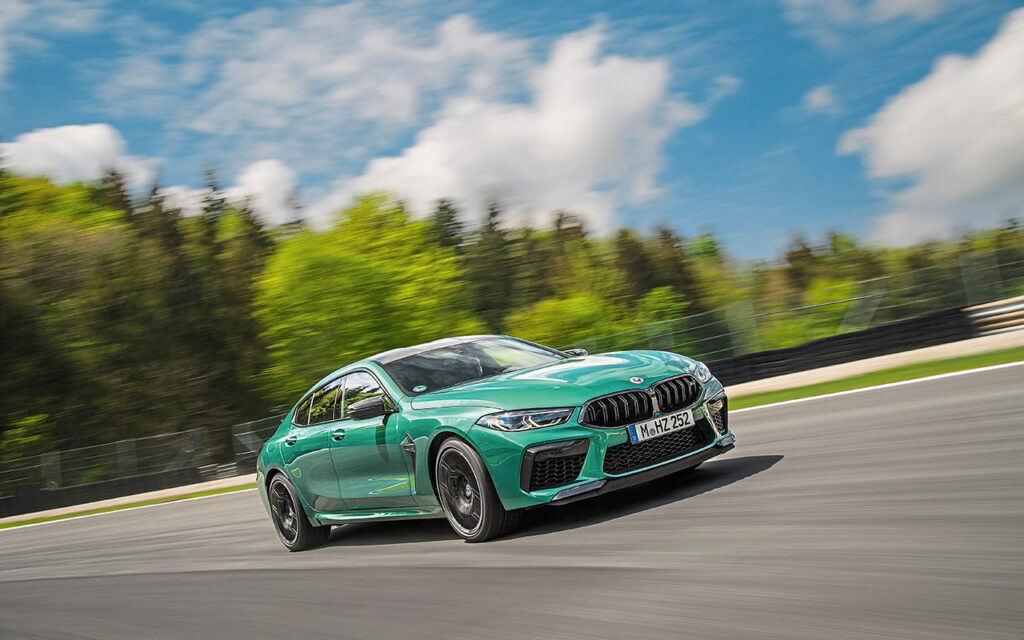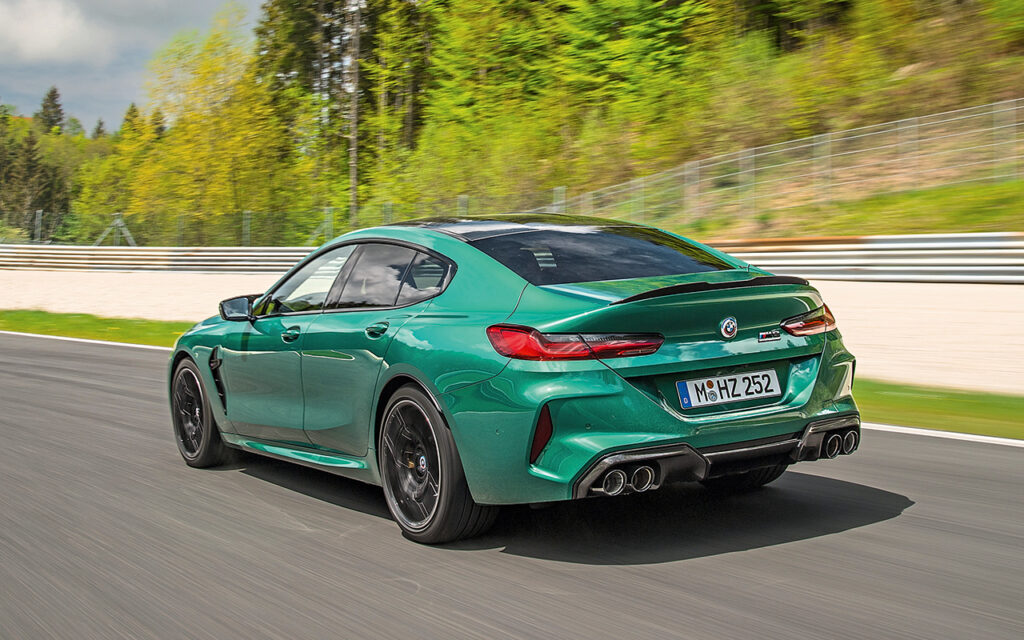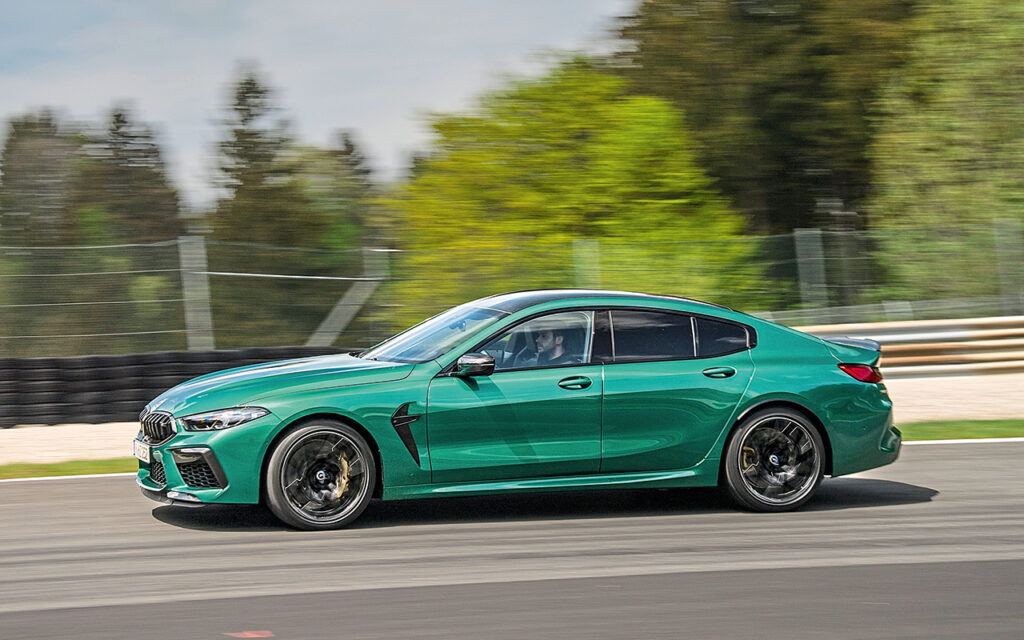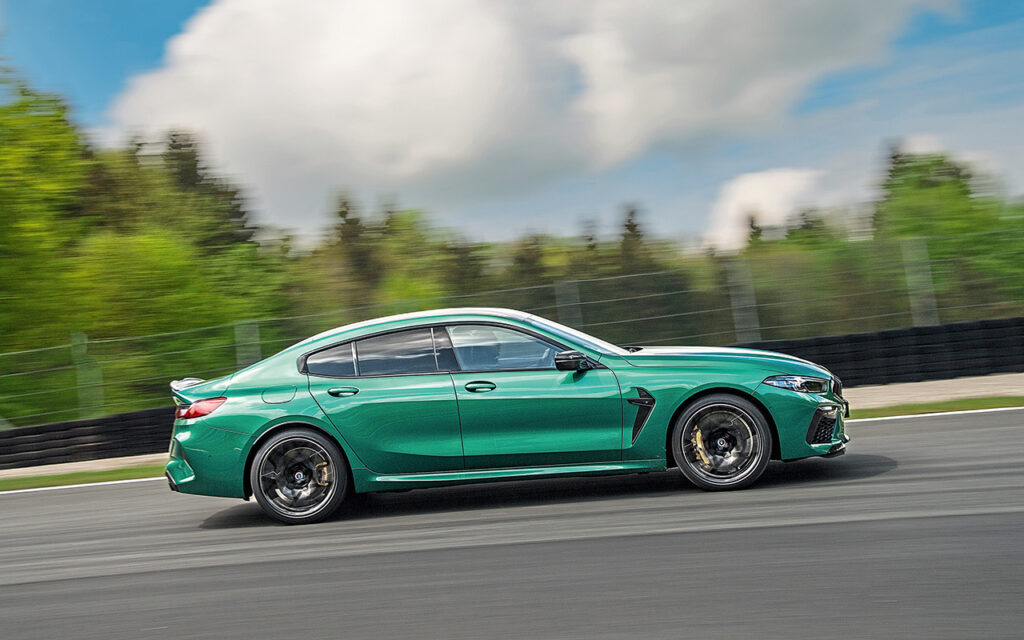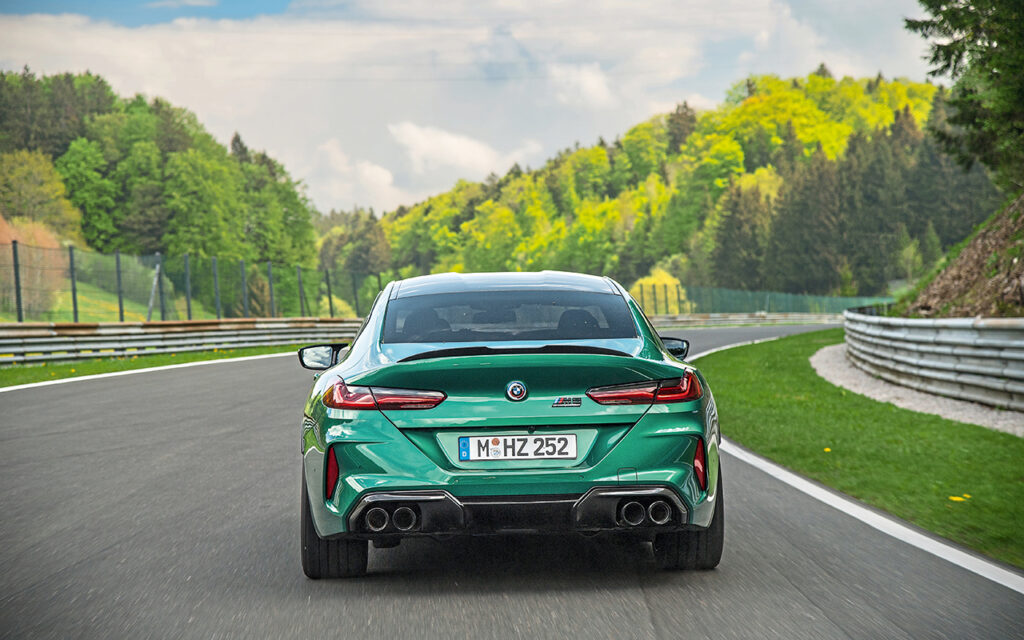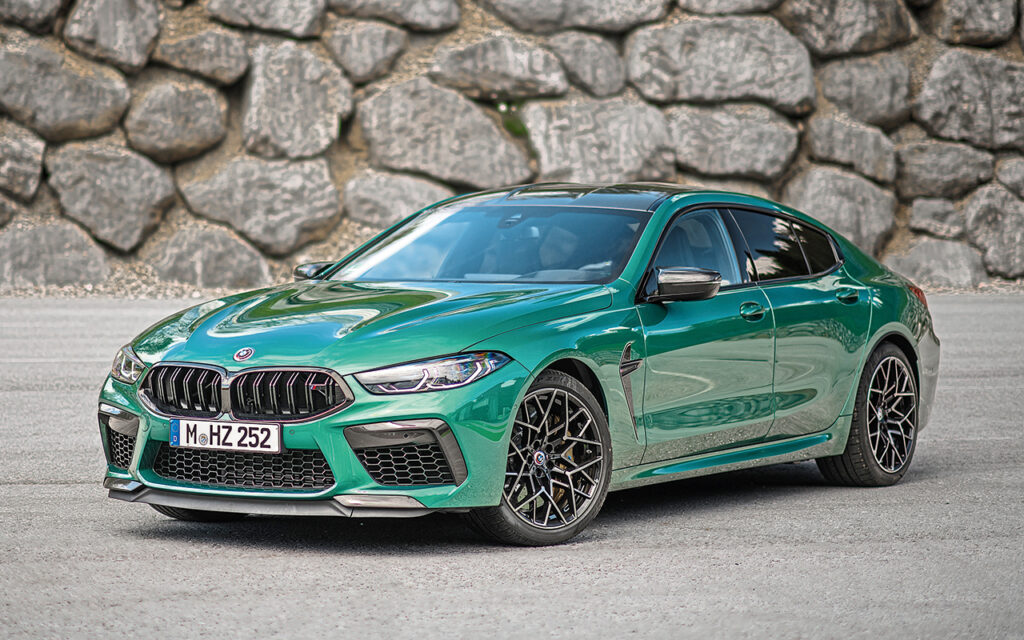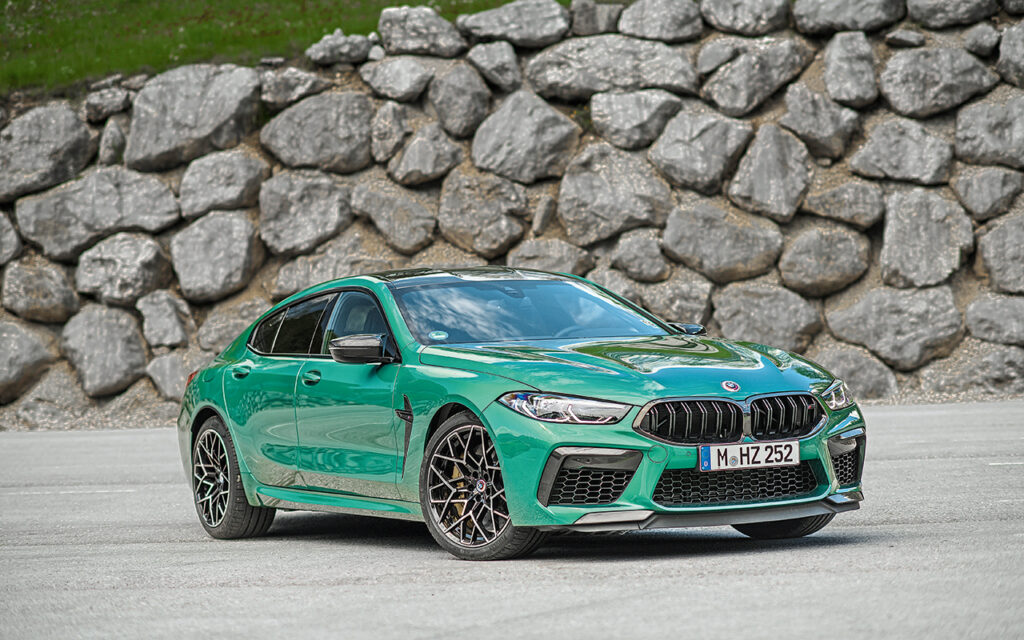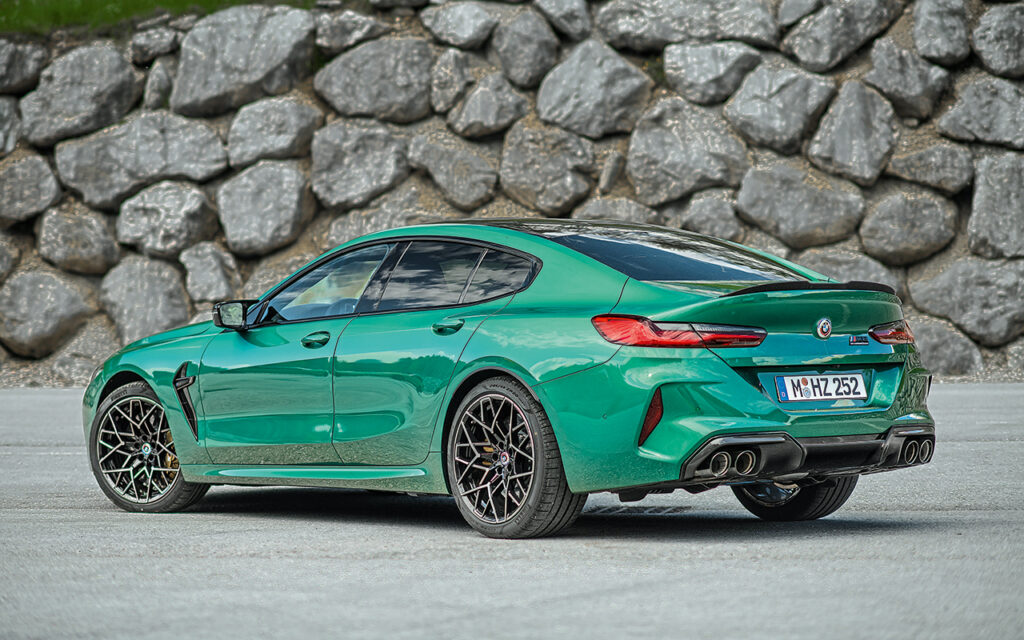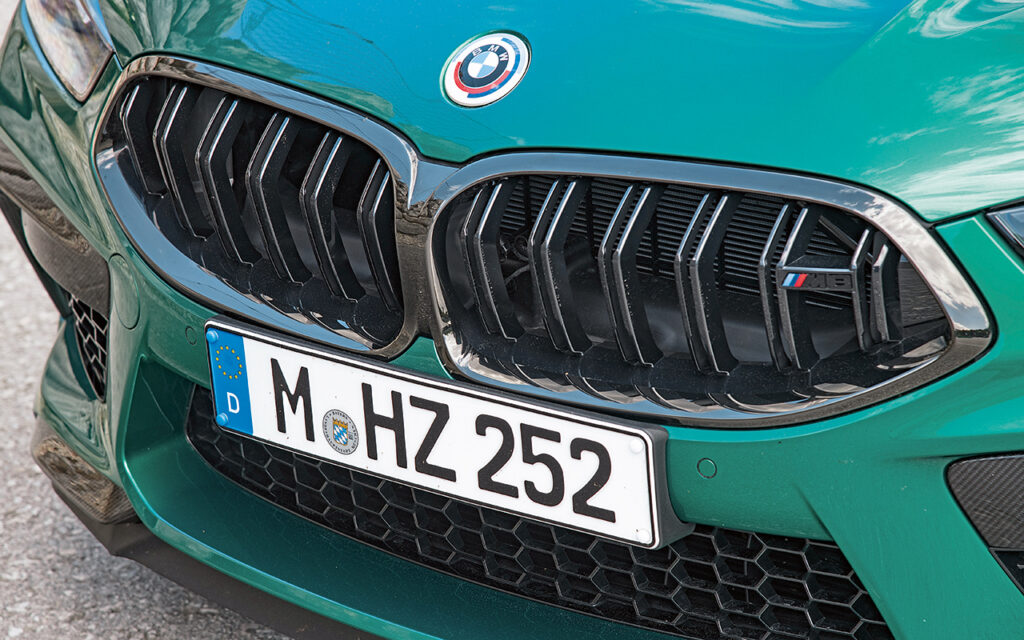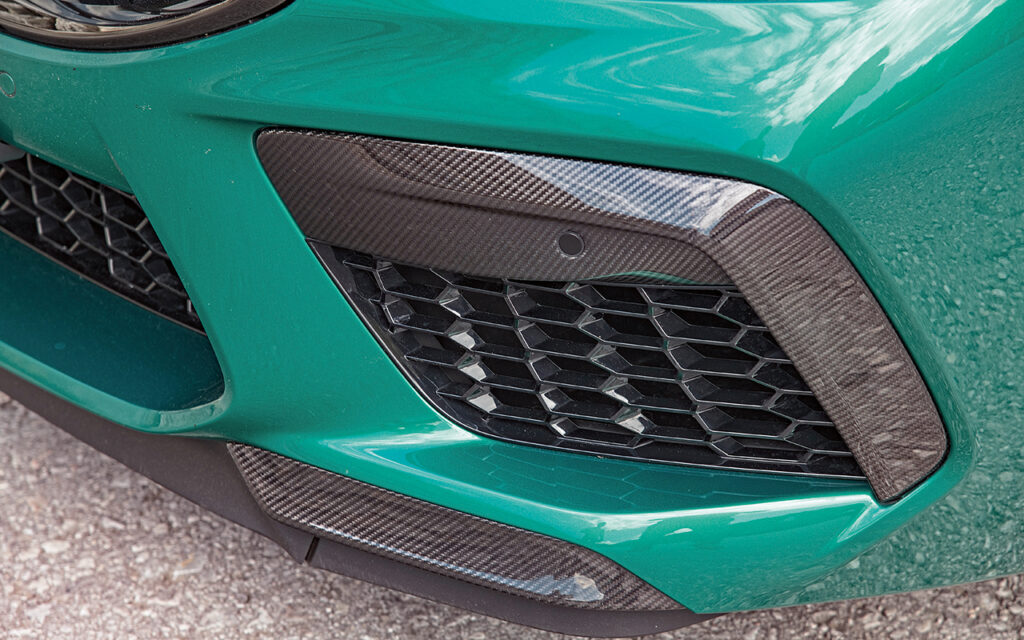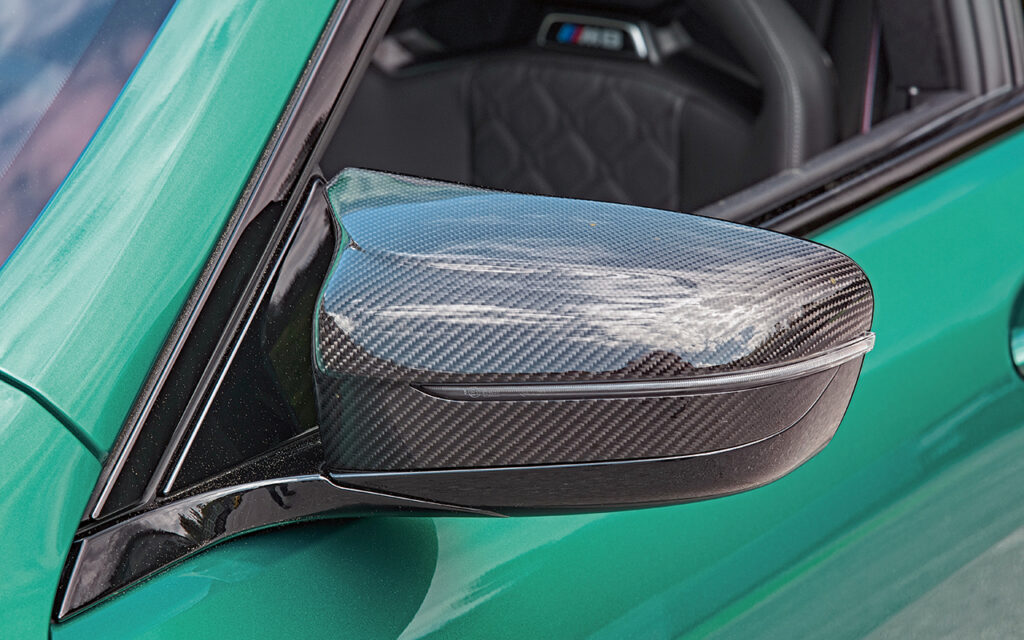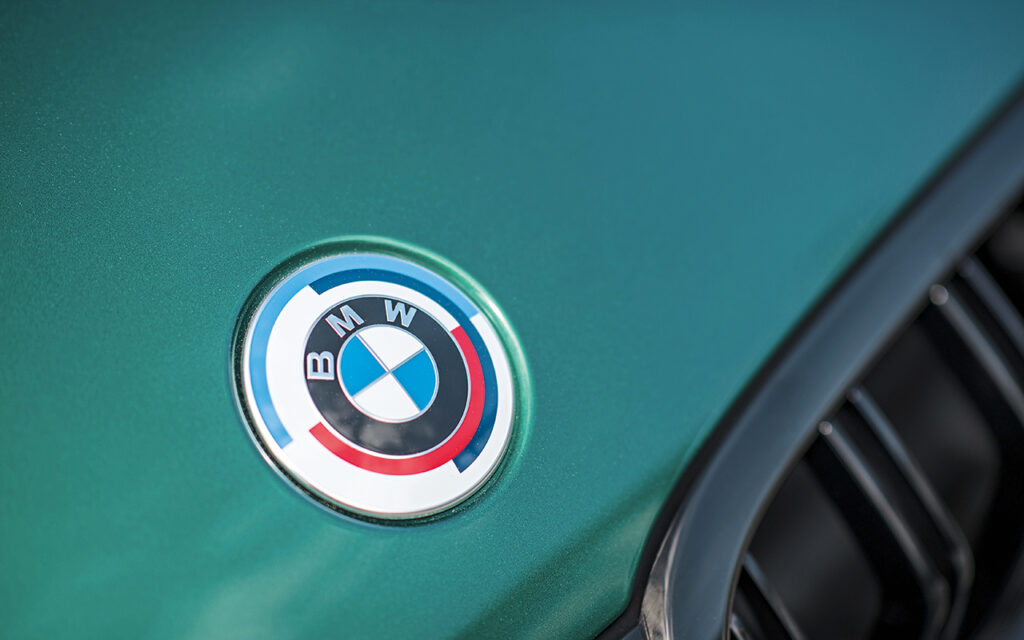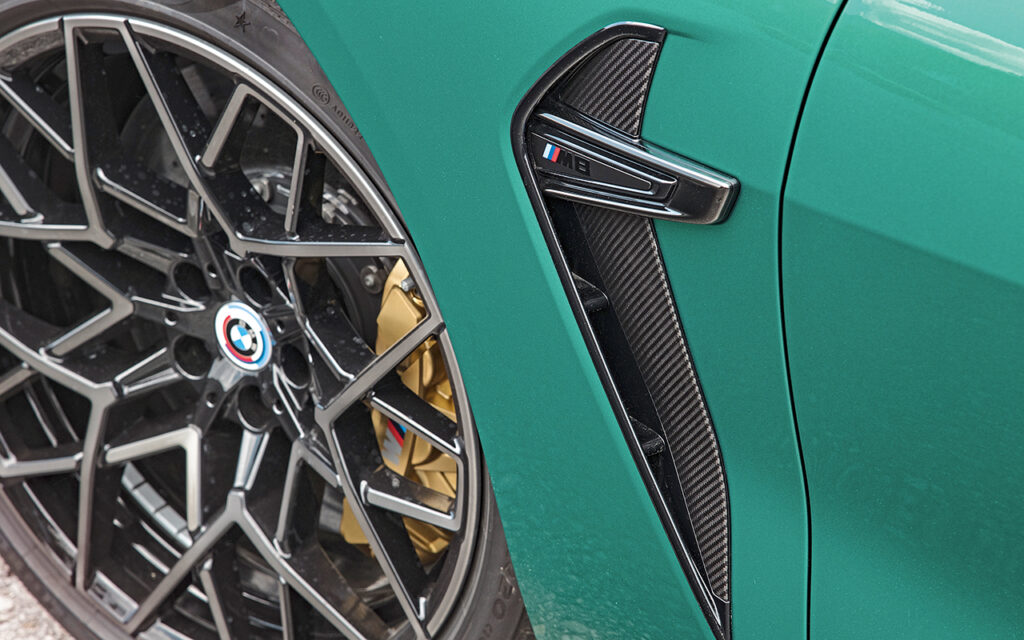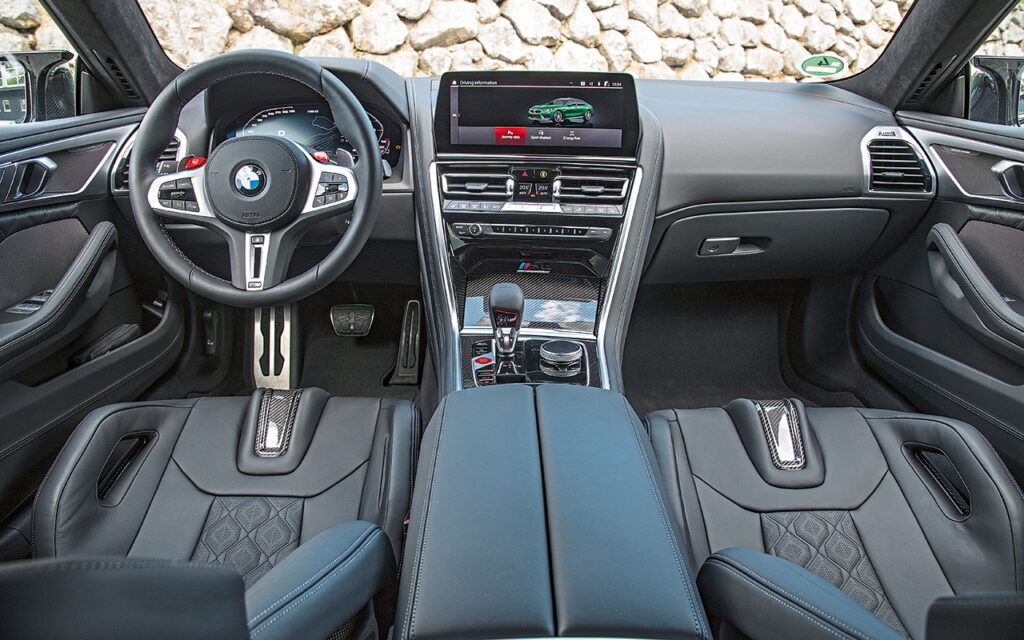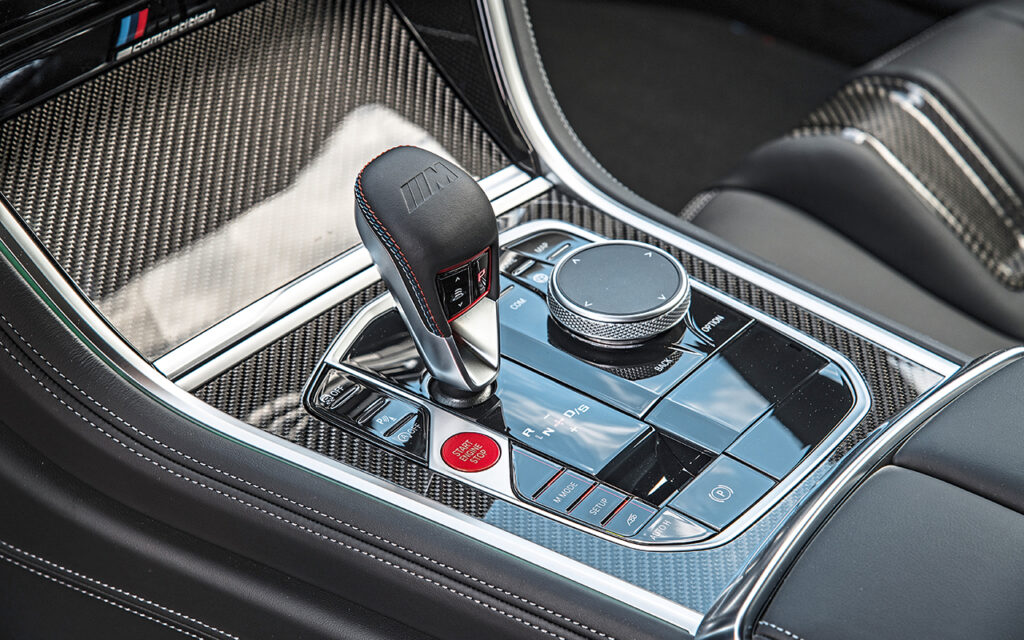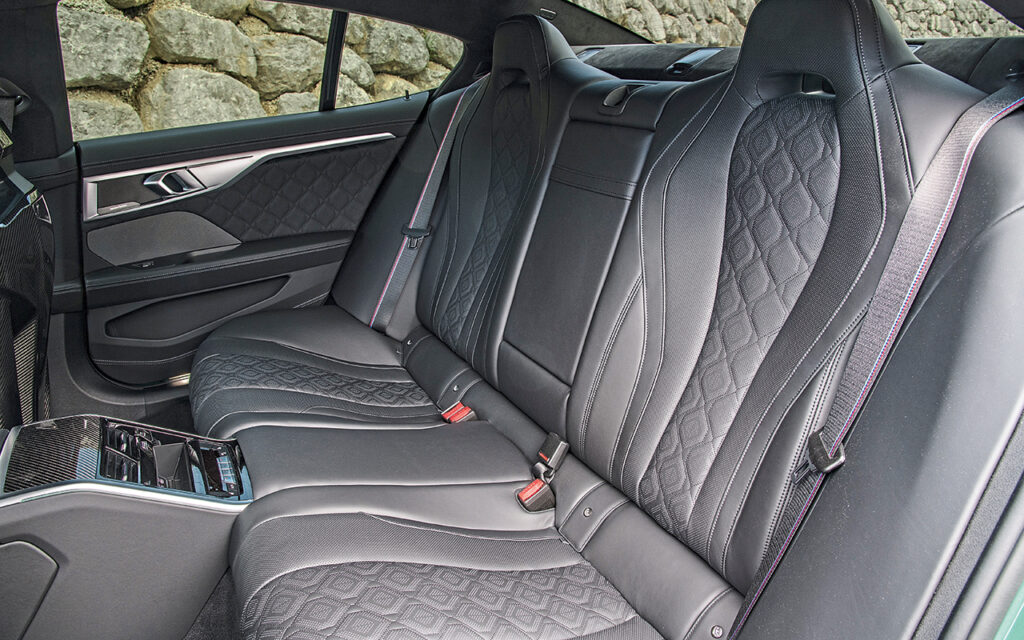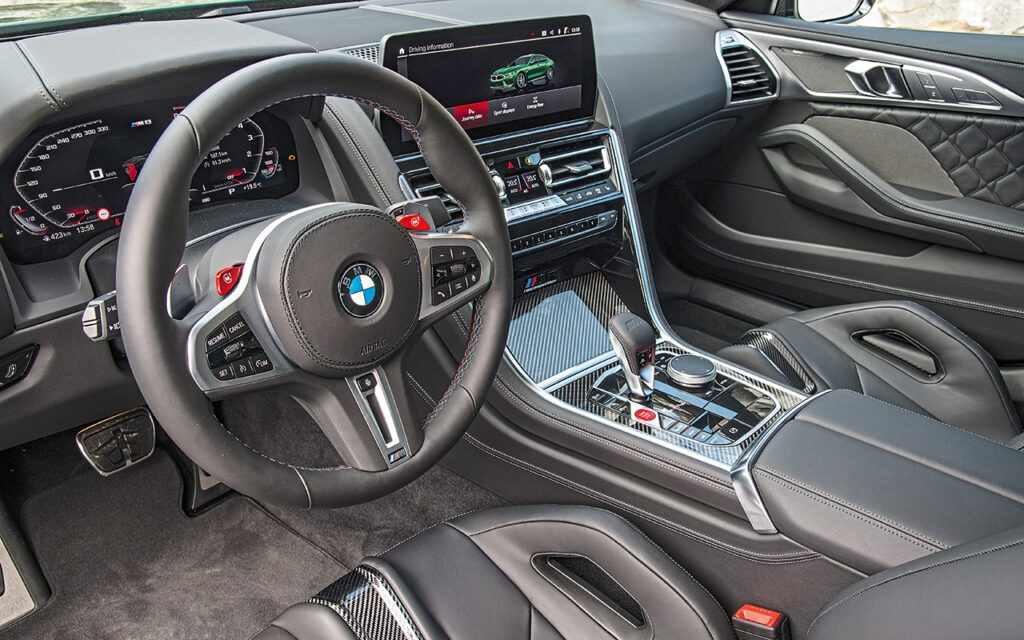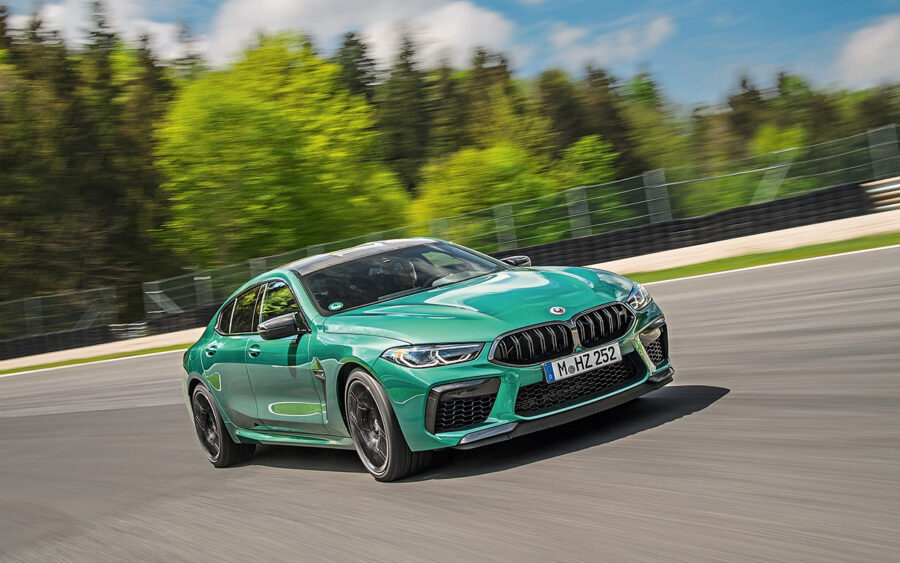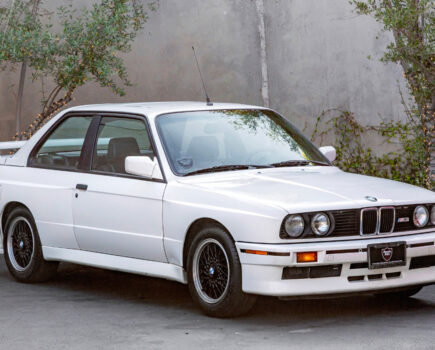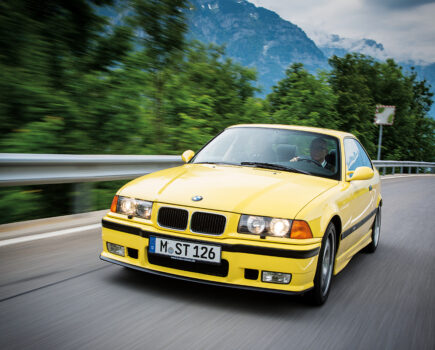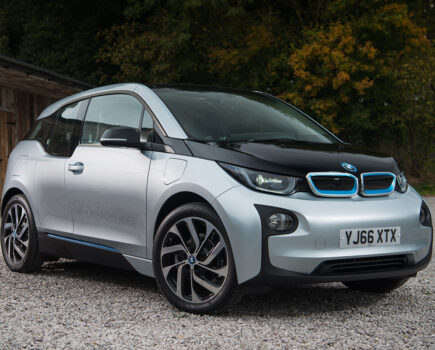The BMW M8 has received its ‘LCI’ updates, which is all the excuse we need to take the four-door Gran Coupé for a blast through Germany
Words: Shane O’ Donoghue
Back in January, BMW unveiled its facelifted 8 Series and M8 (LCI in BMW-speak – for Life Cycle Impulse) line-up, without much fanfare. That’s despite this year being the 50th anniversary of BMW M. In fairness, the updates are only skin deep to BMW’s big GT, but we didn’t need any more excuse than that to take BMW up on its offer of access to the Gran Coupé for a day in Germany.
We arrive at BMW’s press garage outside Munich and it’s difficult not to smile. The test car is finished in the sparkling Isle of Man green colour, which is one of eight new paint shades introduced as part of the model year update. The others are Skyscraper grey metallic, Brooklyn grey metallic, Tanzanite blue metallic, Frozen Pure Grey metallic, Frozen Deep Grey metallic, Frozen Deep Green metallic and Frozen Tanzanite Blue metallic. I reckon the metallic Isle of Man green better-suits the BMW M3’s shape, while one of those ‘Frozen’ hues work best with the larger proportions of the M8 Gran Coupé, but nonetheless it looks a million pounds.
It’s a big car by any measure. Even on Germany’s generously dimensioned country roads it feels as wide as it looks. Of course, that means it’s dripping with menace and presence, even when it’s at a standstill. BMW’s designers resisted tweaking the style of the 8 Series, which is a relief in an age of BMW design that will charitably be known as “opinion-dividing.” We reckon the 8 Series is the best-looking current-generation BMW and the Gran Coupé is the most attractive body style, building on the muscle of the Coupé and Convertible with more elegance thanks to its elongated wheelbase.
Naturally, the M8 is the most aggressive looking variant of them all. Along with the quad exhaust pipes and other expected M signifiers, the updated car comes with a new set of 20-inch alloy wheels in star-spoke design as standard, enhancing the car’s stance. They contrast well with the metallic green paintwork, as does the optional new BMW Individual Lights Shadow Line upgrade for the Laserlights. These feature dark internals and chrome detailing. Our test car also featured the cool 50th anniversary BMW M roundel.
On the subject of options, BMW UK’s configurator is worth a browse. The Comfort Plus Pack is a reasonable £1,800, the Technology Plus Pack a less palatable £5,000. To get all the extra carbon bits shown on our test car you’ll need £6,000 to pay for the M Carbon Pack, while £8,000 gets you the M Pro Pack – featuring the M Driver’s Pack and the M Carbon Ceramic brakes with gold calipers. Fancy all of the above? Then tick the box marked “Ultimate Pack”, costing an eye-watering £21,000. Funny how a car that seems reasonable value-for-money at about £130,000 is suddenly heading north of £150,000. What’s more, while the Ultimate Pack does feature ventilated versions of the standard sports seats, it doesn’t include the M carbon bucket seats. They’re £3,000 extra – or £3,600 as a standalone option.
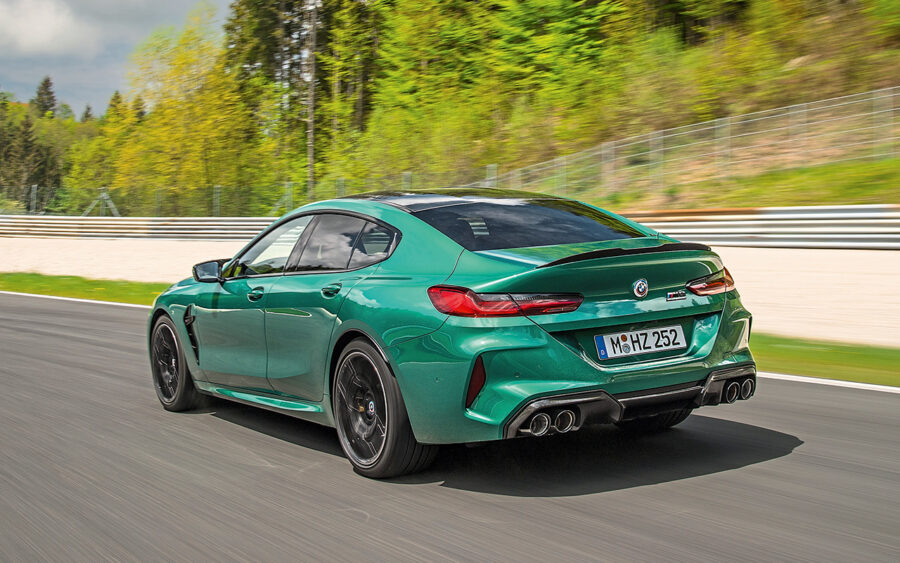
And I’d argue for them being a must-have feature. We’ve tested them in the M3, M4 and forthcoming G87 M2 already, and they suit those overtly sporting cars particularly well, especially as many owners will actually take those vehicles on track at some stage. The M8 is different, though, as, ballistic performance aside, it has always been more of a GT than a sports car. And surely no buyer of the four-door Gran Coupé will ever take it to a track day? Regardless, I still say they’re worth the outlay. They look fabulous for a start and, though the raised section in the middle of the fronts of the seats makes getting in a bit of a faff, the back and shoulder support is just sublime.
After a long day at the wheel, including nearly 300 miles in the M8 and a few hours on track in other cars, I got out without a single twinge or ache in my back. The width of the backrest is adjustable and there’s fine electric adjustment for the rest of the seat, so it takes just moments to find your favoured driving position and it’s easy to tweak when on the move. What’s more, those large cut-outs in the rear of the seat, designed to accommodate harness-style seatbelts, also usefully provide passive ventilation.
The seats won’t suit everyone, but we’d urge buyers to find a way to try them out for a long journey before they decide against. Whether you opt for them or not, the M8’s seats come with a wide range of high-quality leather and Alcantara finishes, including black and Sakhir orange for the first time. The updated models are also marked out by the extended use of Alcantara, on the dashboard and door sills. The keen of eye may also spot that the central touchscreen is a little larger than before, growing from 10.25 inches to 12.3 inches across the diagonal. As ever, the iDrive system is slick and easy to use.
Indeed, the rest of the M8’s controls are entirely familiar, building on those of the 8 Series with the M-specific switchgear, a red engine-start button and of course the red M1 and M2 buttons on the perfectly round three-spoke steering wheel. Buyers can choose from a range of trim finishes for no additional cost, so the cabin doesn’t have to feature the lacquered carbon fibre pictured here.
In contrast to the laughably small rear seats of the M8 Coupé, the Gran Coupé is perfectly capable of transporting four adults in comfort, with an adequately-sized 440-litre boot behind. But enough of that, this car is for driving, not for worrying about luggage space. And drive it we did.
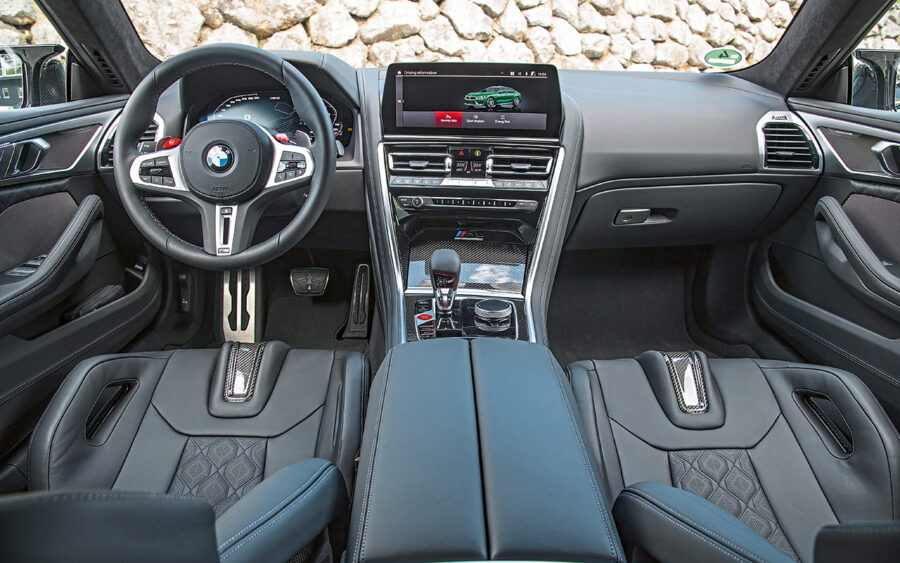
Though the German autobahn network did its best to stifle our fun with what felt like “National Road Works Day”, the M8 was a beguiling companion over the next few hours, allowing us to get under its skin and experiment with the various setup options over a variety of road surfaces and scenarios.
Our first experience of the M8 Gran Coupé in 2020 suggested that it was too firm for everyday use, and that may still be the case for Britons, depending on where they live and the state of the local roads. The three-mode adaptive damping works brilliantly, but we do wish that the default/Comfort setting was softer than it is. Even when using all of the M8’s performance on derestricted autobahn, we stuck with the mid-level Sport setting, as the car tends to jiggle about on its springs at speed in the Sport Plus mode. That’s surely only useful for glass-smooth racetracks. And yes, I know that this is an M car, but being realistic, as already mentioned, few owners will take an M8 Gran Coupé to a race circuit. I suspect most would be glad of a softer suspension setting to allow them to use the car more often.
And it is a car that you’ll want to use. The engine, unchanged in the update, is as mighty as ever, with savagery in its upper reaches, and breath-taking punch in the midrange even when you’re barely tickling the accelerator – notably so in the Sport Plus setting. It sounds outrageous, too, guttural and edgy at low speeds and downright frightening when extended to the speed limiter. It might be a few horses down on the M5 CS, but 625hp and 553lb ft of torque are more than enough for this big four-door.
The M xDrive system is rear-biased of course, but we didn’t trouble the monumental traction and grip available on a hot summer’s day on the public road. The M8 feels rear-driven in the dry, which is all that we can ask for. We did find reason to challenge the upgraded brakes, however, and they weren’t left wanting. Not only was stopping power outrageously strong, but the brake pedal feel is nothing short of fantastic, allowing confident modulation of the system. Just as well with over two tonnes of fast-charging BMW M car to slow down…
Parking the M8 back in its spot at the end of the day, with hot brakes and a pinging exhaust, it became clear that, while this car isn’t the epitome of BMW M-ness, it very much lives up to the 50th anniversary badge on its nose. It’s sensationally quick; it looks astoundingly good; it feels really special; and, if the driving dynamics aren’t as polished as some others in the line-up, it is still a car that you’ll be looking for excuses to take out and drive. The LCI model emphasises all that, while giving owners of the existing car an excuse to go out and buy a new one.
